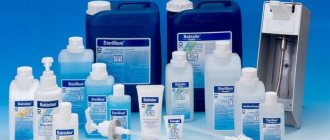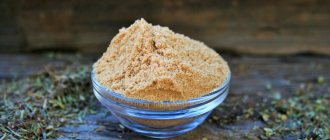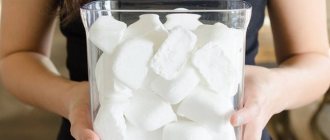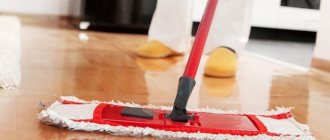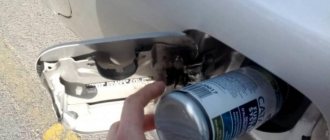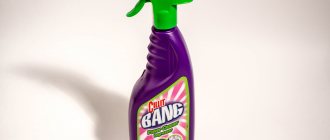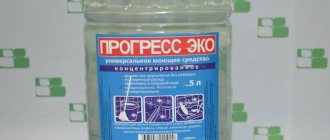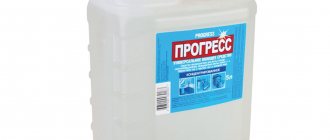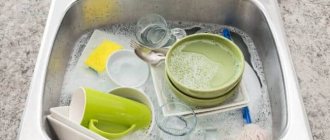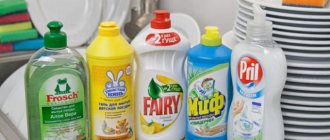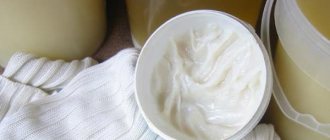Modern household chemical stores present a huge range of products used for cleaning and washing dishes in quick ways. But not all pastes and gels have a safe chemical composition. Therefore, more and more buyers began to choose cleaning products labeled BIO or ECO, which do not cause allergic reactions and do not contain aggressive chemicals. But not everyone can buy such products, so we suggest making your own dishwashing detergents at no extra cost from ingredients that are found in everyone’s household.
Advantages and disadvantages of homemade cleaning products
Increasingly, housewives are resorting to the services of homemade detergents, which have proven themselves to be excellent even for our grandmothers, or to the help of cleaning products prepared with their own hands.
Pros of homemade cleaning products:
- Self-made products are environmentally friendly, they do not have a negative effect on your body, since they are completely washed out with water.
- There are no aggressive chemical elements in such products, which means they will not cause allergic reactions.
- All components of household cleaning products are low cost and highly available
- If you have time and desire, you can prepare a whole arsenal of detergents for different purposes.
Disadvantages of homemade cleaning products:
- A product made with your own hands is used more often and is used up faster than a purchased concentrated product.
- To make the product you will have to spend your time
- During the manufacturing process, you will constantly experiment, look for the best option for the prepared mixture, etc.
If you are determined to use homemade products, then start with the least aggressive ingredients, since they are quite sufficient for normal washing and cleaning.
Soda
Baking soda works well for washing dishes. Even if he swallows it, there will be no problem. It is enough to dissolve 1 tablespoon of powder in lukewarm water (1 liter).
A solution of natural baking soda can whiten fittings, tiles and even linens.
Baking soda restores yellow glassiness, removes soot from pots and pans, cleans stoves and ovens, and gets rid of soot and tea deposits. To enhance the effect, it is supplemented with other components.
How to make dishwashing liquid at home
Such recipes usually include laundry soap, glycerin to soften hands, soda, salt, acids and ammonia. These are all the tools that we use in everyday life.
Washing gel made from laundry soap with glycerin
To prepare this product you will need:
- ½ bar of laundry soap
- 8 tbsp. glycerin
- 1 liter hot water
- 30 grams of vodka (or 2 tbsp.)
Pour water into a bowl, pour in finely grated soap and place in a water bath to completely dissolve. Stir the soap mass periodically. When the mixture is ready, add glycerin and vodka to it to enhance the cleaning effect. Then pour the mixture into a previously prepared bottle and use it as needed.
This product not only perfectly removes grease from the surface of dishes, but also does not dry out the skin of your hands.
Soda based detergent
An effective product is made from regular baking soda. To make it you will need:
- a piece of baby soap, finely grated
- 5 tbsp. soda
- 1 cup boiling water
- a few drops of any essential oil
Mix all ingredients thoroughly with a blender until smooth. Transfer the resulting paste into a container convenient for use.
Read more: How to clean carbon deposits from stainless steel pots using homemade products
Universal gel paste
This universal product can be used for cleaning dishes and for cleaning sinks and tiles in the kitchen. It also perfectly removes yellow stains on the surface of the bathtub.
You will need:
- 3 tbsp. l. laundry soap shavings
- 3 tbsp. l. dry mustard
- 4 tbsp. l. ammonia
- 1 liter hot water
- 3 tbsp. l. soda
Dissolve the soap completely in hot water and then cool. Add mustard and soda to the solution and mix. Then add ammonia, mix again, cover with a lid and let it brew for three hours. Transfer the finished product into a container convenient for use.
IMPORTANT: when making such a product, do not forget to open the window or use a hood so that the caustic ammonia vapors do not harm the body.
Washing liquid for dispenser
To make this mixture you will need:
- 250 gr. hot water
- 1 tbsp. hydrogen peroxide
- 1 tbsp. l. baking soda
Mix everything and place it in a bottle with a dispenser. This product can be used to wash all kitchen surfaces, to clean household appliances and tiles.
Read more: How to clean an enamel pan from burnt food using homemade products
An effective remedy made from mustard powder and soda
Many experienced housewives wash greasy dishes with mustard water. We can also make some kind of soap or paste to remove grease from dishes and kitchen counters. For this you will need:
- 1 pack of dry mustard
- 50 gr. baking soda
Gently dilute a pack of dry mustard with lukewarm water until it becomes thick sour cream, then add 50 grams of baking soda, mix and the product is ready for use. We apply this product to problem areas and without any effort, all the fat and carbon deposits will come off on their own.
IMPORTANT: it is advisable to use this product with gloves so as not to burn your hands.
Homemade detergents should not be stored for more than two weeks, as they then lose their cleaning effect.
These products should be stored in a dark, cool place and in a convenient, tightly closed container.
Vinegar
Vinegar is used to thoroughly clean dishes. It perfectly removes stains from tiles and floors, and cleans plumbing fixtures to a shine.
How to make a folk dishwashing liquid using vinegar:
- For stainless steel kitchen utensils, a solution of salt and vinegar in equal proportions is suitable. Rub it on all surfaces and rinse well with water.
- Wash porcelain with vinegar mixed with mustard powder. You will also need to add a little baking soda. All ingredients are combined in a 1:1:1 ratio.
Table vinegar is an impeccable and safe substance. It copes well with grease stains and disinfects.
After using vinegar, the dishes will need to be ventilated a little.
Just leave it on the kitchen counter covered with a clean towel for a while. And after 30–60 minutes, put everything in its place.
DIY dishwasher detergents
More and more housewives prefer dishwashers, thus saving themselves from time-consuming and annoying work. BUT such a unit requires special care and attention. In particular, you should carefully select a detergent for this assistant so that it is both environmentally friendly and effective, and also takes care of the machine itself.
But most dishwashing detergents are made from surfactants, acids and water softeners. In addition, their composition necessarily includes bleaches, fragrances, dyes, phenol, etc. All doctors in the world have long been talking about the dangers of such drugs for the human body.
What to do? Give up a convenient device that frees women from the long process of washing dishes? Of course not. There is always an alternative. We can make our own eco-friendly dishwasher detergent at home.
Baking soda and hydrogen peroxide
To wash dishes without carbon deposits and soot, you can use the following mixture:
- 200 g hot water
- 1 tsp soda ash
- 1 tsp hydrogen peroxide.
Baking soda and dry mustard powder
We have already talked a lot about the benefits of dry mustard, so we cannot ignore this dishwasher product.
You will need:
- half a cup of dry mustard powder
- glass of soda ash
- half a cup of borax
Mix everything and place in a tightly sealed container. Add detergent as needed to the dishwasher. One tablespoon is required per cycle.
IMPORTANT: if you have hard water, you should definitely add salt.
Apple vinegar
Surely, every housewife has a bottle of apple cider vinegar in her house. Pour it into a container for bulk detergents, approximately 60 ml per set of dishes. It is less aggressive than ordinary table vinegar, does not corrode rubber and plastic parts, but copes well with common stains.
Citric acid and baking soda
If, in addition to the plates, you also need to wash the pots, then pour 2 tbsp into the dispenser. bread soda and citric acid. This has long been a well-known detergent for washing dishes by hand and is also perfect for use in washing machines.
Lemon
Lemon is an excellent product that copes with many contaminants. It is used not only to remove stains from clothes, but also to wash dishes.
How to use:
- You can use the lemon pulp at your discretion, but do not throw away the peel. Take it and clean the boards. Lemon perfectly removes the smell of fish, garlic and onions. They can also wash your hands of these aromas.
- If you are going on a picnic, take this citrus with you. The inside of the bag will smell nice, and then you can use it for washing.
- Cut the lemon in half and put it in the teapot. Fill with water, boil and leave for 30 minutes. The acid does a great job of removing limescale inside.
Lemon juice can be added to any home remedies. This is a natural flavoring. It will get rid of any unpleasant odors.
Soda-hydrogen "fizzy"
Dish detergent can be replaced with hydrogen peroxide and baking soda. The composition is suitable for all types of dishes, as well as for stoves and ovens. We offer 2 cooking methods:
- Add 1 tablespoon of baking soda to 200 ml of hot water and sodium bicarbonate, pour into a bottle, shake.
- Spray onto dirty dishes and work surfaces, leaving the composition for 8-10 minutes, and then rinse as usual;
- if you add 1/4 peroxide to 1/2 tablespoon baking soda, you will get a thick substance. Convenient to clean the refrigerator, oven, enamel pans.
For convenience, pour the product into a spray bottle.
Homemade cleanser, excellent whitening agent. Peroxide can be replaced with vinegar mixed in equal proportions with the main ingredient. Wear rubber gloves while working.
Features of application
When cleaning with homemade gels, you need to consider the following nuances:
- To increase the emulsifying properties of natural ingredients, you need to wash dishes in hot water. If its temperature is below 400C, then greasy marks and stains may remain on the surfaces.
- If the water hardness (pH) is high, you need to use a product with soda. To soften old grease, you can soak the dishes in hot water with 2-3 tsp. sodium bicarbonate.
- Baking soda, salt, and other abrasives should not be used to clean items with thin coatings (such as gold plated).
- It is recommended to use soap and ammonia gels only with gloves.
- Teflon coated surfaces should not be exposed to acids or abrasives. Before washing, they need to be soaked in warm water with soda, and then gently rubbed with a paste of laundry soap.
- Aluminum cookware does not tolerate prolonged soaking, boiling in soda, or the action of alkalis and acids. If improperly cleaned, a matte layer of oxides will form on its surface. This effect also has a positive effect: less carbon deposits form on highly oxidized dishes.
- Vinegar and lemon are not used to clean copper cookware.
Pots, baking dishes and frying pans should only be washed after they have cooled completely.
Pros and cons of homemade gels and pastes
The benefits of homemade dishwashing remedies are:
- simple composition;
- low cost;
- the ability to select a convenient consistency;
- harmless for children and allergy sufferers.
The disadvantages include the following aspects:
- the need to combine several recipes for severe or old stains;
- labor-intensive preparation;
- high cost of funds;
- short shelf life;
- poor foaming, especially in cold water.
The features of each composition are presented in more detail below:
| Components | Advantages | Flaws |
| Laundry soap | Suitable for all types of dishes, does not cause allergies | Has an unpleasant odor, dries the skin very much, is ineffective in hard and cold water |
| Soap + soda | Maintains effectiveness in hard water and has an abrasive effect | Not used for dishes with gold plated or thin coatings Ready-made products have a strong aroma Mustard can cause skin irritation |
| Mustard | Removes grease, gently cleans off fresh deposits, does not leave microdamages on the surface | |
| Soap + coffee + mustard | Combines abrasive and anti-greasy properties | |
| Vinegar | Indispensable for cleaning dishes from scale and mold | Does not affect fat Does not apply to washing Teflon, aluminum, copper |
| Lemon | Has a pleasant smell, used for delicate washing (for example, porcelain and fine glass) | Not suitable for coatings that are not resistant to acids May cause allergies (only during washing) |
| Ammonia | Effective against old fat and carbon deposits | It has a pungent odor; you need to protect your hands when using it, and when washing and cooking for a long time, protect your eyes and nose. |
Why prepare your own cleaning products?
The main active component of dish gels is synthetic surfactants (surfactants) .
Compared to regular soap, they dissolve grease better, do not leave streaks, and do not lose effectiveness in cold and hard water.
But high surface activity complicates the removal of surfactants from dishes. Even if objects seem clean, a thin film remains on them, which, along with food, passes into the digestive tract.
Natural products, such as soap or soda, have less affinity for the surface, so they are easily washed off from dishes .
The composition of industrial products is described only in general terms (for example, “non-ionic surfactants”, “anionic surfactants”, “preservative”, etc.), therefore the presence of allergens in them cannot be excluded. Homemade gels, as a rule, have a simpler set of components. If you are allergic to any of them, you can replace it or choose a different recipe.
